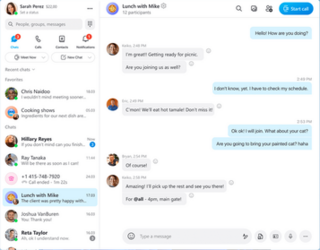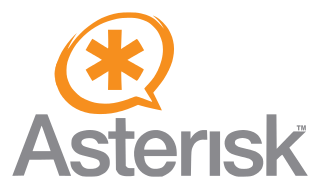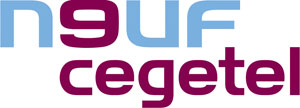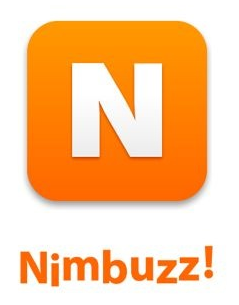Voice over Internet Protocol (VoIP), also called IP telephony, is a method and group of technologies for voice calls for the delivery of voice communication sessions over Internet Protocol (IP) networks, such as the Internet.

Skype is a proprietary telecommunications application operated by Skype Technologies, a division of Microsoft, best known for VoIP-based videotelephony, videoconferencing and voice calls. It also has instant messaging, file transfer, debit-based calls to landline and mobile telephones, and other features. It is available on various desktop, mobile, and video game console platforms.

Asterisk is a software implementation of a private branch exchange (PBX). In conjunction with suitable telephony hardware interfaces and network applications, Asterisk is used to establish and control telephone calls between telecommunication endpoints such as customary telephone sets, destinations on the public switched telephone network (PSTN) and devices or services on voice over Internet Protocol (VoIP) networks. Its name comes from the asterisk (*) symbol for a signal used in dual-tone multi-frequency (DTMF) dialing.

Skype for Business Server is real-time communications server software that provides the infrastructure for enterprise instant messaging, presence, VoIP, ad hoc and structured conferences and PSTN connectivity through a third-party gateway or SIP trunk. These features are available within an organization, between organizations and with external users on the public internet or standard phones.

A VoIP phone or IP phone uses voice over IP technologies for placing and transmitting telephone calls over an IP network, such as the Internet. This is in contrast to a standard phone which uses the traditional public switched telephone network (PSTN).
Gizmo5 was a voice over IP communications network and a proprietary freeware soft phone for that network. On November 12, 2009, Google announced that it had acquired Gizmo5. On March 4, 2011, Google announced that the service would be discontinued as of April 3, 2011.

Jajah was a VoIP provider, founded by Austrians Roman Scharf and Daniel Mattes in 2005. The Jajah headquarters was located in Mountain View, CA, USA, and Luxembourg. Jajah maintained a development centre in Israel. On 23 December 2009, it was announced that Jajah had been bought by Telefónica through its subsidiary Telefónica Europe. In December 2013, Telefónica announced that Jajah would shut down at the end of January 2014.
QuteCom was a free-software SIP-compliant VoIP client developed by the QuteCom community under the GPL-2.0-or-later license. It allows users to speak to other users of SIP-compliant VoIP software at no cost. It also allows users to call landlines and cell phones, send SMS and make video calls. None of these functions are tied to a particular provider, allowing users to choose among any SIP provider.
VoIP User was a community-driven and financed SIP based VoIP network. The project's aim was to allow users to experiment with VoIP by providing opportunities to work with SIP and IAX2 devices.
This is a comparison of voice over IP (VoIP) software used to conduct telephone-like voice conversations across Internet Protocol (IP) based networks. For residential markets, voice over IP phone service is often cheaper than traditional public switched telephone network (PSTN) service and can remove geographic restrictions to telephone numbers, e.g., have a PSTN phone number in a New York area code ring in Tokyo.
Mobile VoIP or simply mVoIP is an extension of mobility to a voice over IP network. Two types of communication are generally supported: cordless telephones using DECT or PCS protocols for short range or campus communications where all base stations are linked into the same LAN, and wider area communications using 3G or 4G protocols.

Neuf Cegetel was a French wireline telecommunications service provider and a mobile virtual network operator (MVNO). It offered various telecommunications services to consumers, enterprises and wholesale customers, ranking second in the country in annual revenues. It was legally established in 2005 following the completion of the merger between Neuf Telecom and Cegetel. As of June 2008, the company became a wholly owned subsidiary of SFR, and the brand disappeared commercially.
Yahoo Voice was a Voice over Internet Protocol (VoIP), PC-PC, PC-Phone and Phone-to-PC telecommunications service. It was provided by Yahoo via its Yahoo Messenger instant messaging application.
Skype offers a number of features based around calling, messaging, video chat, and file and screen sharing. The following is a partial list of Skype's features:
OpenSky was a service provided by Gizmo5, which is now out of business, to enable communication between users of SIP and users of Skype.

The 3CXPhone System is the software-based private branch exchange (PBX) phone system developed and marketed by the company, 3CX. The 3CX Phone System is based on the SIP standard and enables extensions to make calls via the public switched telephone network (PSTN) or via Voice over Internet Protocol (VoIP) services on premises, in the cloud, or via a cloud service owned and operated by the 3CX company. The 3CX Phone System is available for Windows, Linux, Raspberry Pi and supports standard SIP soft/hard phones, VoIP services, faxing, voice and web meetings, as well as traditional PSTN phone lines.
VaxTele SIP Server SDK is a complete development toolkit, which allows software vendors and Internet telephony service providers (ITSP) to develop SIP Server and (SIP) Session Initiation Protocol based VoIP systems for Microsoft Windows to install computer to computer voice chat, chat rooms, IVR systems, call center services, calling card services, dial/receive computer to PSTN and mobile phone calling services.

Nimbuzz is a proprietary cross-platform instant messaging and social media and mobile payment developed by Kuraakani Online Private Limited, with the origins of its technology dating back to the early 2000s. As of March 2013, Nimbuzz had 150 million users in 200 countries. By April 2014, Nimbuzz was growing by more than 210,000 new registrations per day. In October 2014, now with over 200 million users, New Call acquired 70% of Nimbuzz, valuing the app at $250 million. Under CEO Sujit Acharya's leadership, Nimbuzz suite of applications enables users to enjoy end-to-end encrypted free calls, instant messaging, games, file sharing, social networking, mobile payments & movies on their mobile device. Nimbuzz has more than 3 million lines of code. Initially, Nimbuzz offered discounted calling rates to most countries in the world. The platform processed more than a billion call minutes and in excess of 100 billion messages a month.

Upptalk was a proprietary voice-over-IP service and software application that provided mobile phone numbers in the cloud and allows users to call or text any phone for free whether or not the device receiving the calls and texts has the Yuilop application. The service was discontinued in 2017 and even its domain was abandoned.
WebRTC Gateway connects between WebRTC and an established VoIP technology such as SIP. WebRTC is an API definition drafted by the World Wide Web Consortium (W3C) that supports browser-to-browser applications for voice calling, video chat, and messaging without the need of either internal or external plugins.









